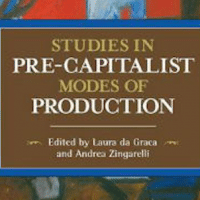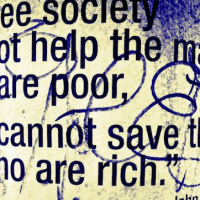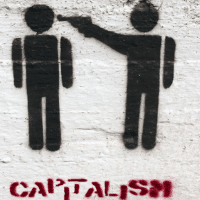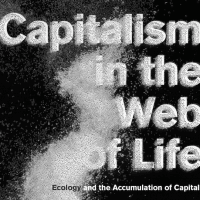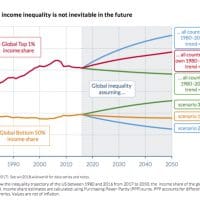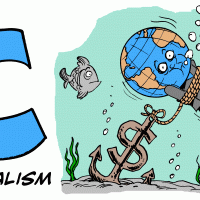-
Studies in pre-capitalist modes of production
Marxism is not simply a form of anti-capitalism, but is a theory of the social and historical nature of humanity. Capitalism was understood by Marx to be a specific historical phase, in which the cycles and tendencies of human activity are qualitatively different than in previous periods, each of which had their own specificity.
-
Neoliberalism’s populist bastards
After the twin victories of Brexit and Trump in 2016, observers across the political spectrum described a face-off between populism and neoliberal globalism. Davos Man, we were told, stood shamed before the wrath of the masses. In a series of electoral defeats for the center and left, the world’s elites were reaping the fruits of the inequality and democratic disempowerment they had sown.
-
Introduction to the material constitution
In a couple of previous posts on Legal Form, Rob Hunter has reminded us of the importance and aptness of a Marxist approach to the analysis of public law. Hunter’s intervention could not be more timely: even after the economic and financial crisis, and despite the comeback of Marxism as a relevant intellectual source at least within certain legal domains (think, for example, of international law) [1], there has not yet been a Marxist revival in constitutional studies. One possible explanation for this phenomenon (though likely not the only one) is the discredit and almost total obliteration of the best-known Marxist contribution to constitutional studies: Lassalle’s notion of the material constitution.
-
NYT joins campaign to purge the term, “white monopoly capital” in South Africa
The New York Times, the world’s premier journalistic purveyor of a “fake,” imperial, and profoundly white capitalist world view — masquerading as all the news that’s fit to print — wants us to believe that a now-bankrupt London-based public relations firm is behind South Africa’s regime-shaking debate over the rule of “white monopoly capital.”
-
How should socialists understand finance: remembering the lessons of Capital
For those on the Left, finance seems like a bourgeois pastime. Many of us outright despise the stuff. While the petit bourgeoisie drool over dividends and diversification, we prefer to focus on crisis and class.
-
Value, credit and crisis: Reading Marx out of context can lead to confusion
A literalist, out-of-context reading of Marx can get one into trouble, or at the very least, leave you hopelessly confused. For help, I look to David Harvey. Perhaps the preeminent expert on Marx’s Capital in the English-speaking world, Harvey meticulously reconstructed Marx’s approach to money in his major treatise, Limits to Capital (1982).
-
This is for the Guardian, NYT and the BBC: 1939 to 2018
Before I go any further with this let me state that I’m not a Trotskyist, or a Leninist, or a Stalinist or a Maoist (but I might have been all of the above, with exception of Maoist, at one time or another).
-
The end of the road for capitalism or for us all?
we have the certainty that matter remains eternally the same in all its transformations, that none of its attributes can ever be lost, and therefore, also, that with the same iron necessity that it will exterminate on the earth its highest creation, the thinking mind, it must somewhere else and at another time again produce it”. —
Frederick Engels, from the introduction to ‘The Dialectics of Nature’, 1883. -
On the contribution of István Mészáros (1930-2017) to critical thinking
István Mészáros, an outstanding Hungarian Marxist philosopher, died on October 1st 2017 in London. Born in Budapest in 1930 into a working-class family, brought up by his mother, he began working in industry at the age of twelve. He actually lied about his age, claiming to be sixteen, in order to be accepted by the factory.
-
The kids aren’t alright
When we talk about generations, we tend to talk as if history has always been divided up into them. But the idea of distinct eras of cohorts each defined by some unique spirit is not timeless. The notion of a generation was borne of a conception of history as a machine of progress—a claim central to Enlightenment ideology
-
‘On new terrain’—How Capital is reshaping the battleground of class war
Since the Great Recession there has been much debate on the nature of capitalism and the crisis of neoliberalism. Often this has resulted in theories which emphasise finance capital, precarious employment, and play to a generally left Keynesian politics, such as that being pursued within the Labour Party currently.
-
Ecology and value theory
Jason W Moores Capitalism in the Web of Life sets itself the challenge of locating an account of capitalist commodity production inspired by Karl Marx within the biological, chemical and geological totality we normally call nature. The ambition of the book is therefore immense. Moore proposes a method for understanding world history that shows how economic development is connected to long-wave ecological transformations. At a time when humanity faces profound and simultaneous ecological and economic crises, Moore proposes a kind of meta-theory that explains them as the outcomes of a single logic.
-
Trashing the planet for profit
Before I began this essay I read through some of my past forays that mentioned climate change and capitalism, the first I think, being in 2006 where I opined in a piece on the ‘War on Terror’.
-
Illusions of world-ecology
Every airport bookstore features books with titles like 10 Ways to Retire Rich, 150 Places You Must Visit Before You Die, or 8 Easy Steps to a Flatter Tummy, with the numbers in very large type on their covers. They are the publishing equivalent of junk food, quickie books written to match titles that were invented by the marketing department to generate impulse purchases. The authors and publisher of A History of the World in Seven Cheap Things must have had such books in mind when they chose its title and designed its cover.
-
The elephant in the world
The authors of the report confirm what Branko Milanovic and others had previously discovered: that a representation of the unequal gains in world economic growth in recent decades looks like an elephant. Thus, the real incomes of the bottom 50 percent of the world’s population (except the poorest, at the very bottom) have increased, the incomes of those in the middle (especially the working-class in the United States and Western Europe) have decreased, and the global top 1 percent has captured an outsized portion of world economic growth since 1980.
-
Schumpeter’s two theories of imperialism
Schumpeter’s theory is interesting for several reasons. It was formulated at the same time as Lenin’s and Luxemburg’s and clearly with the knowledge of the two. It reacts to the exactly the same events as theirs. It is different though and it was held by Schumpeter throughout his life. The key text for Schumpeter’s theory is “The sociology of imperialisms” (note the plural) published in 1918-19.
-
The new Mafia capitalism
MISHA GLENNY’S new series McMafia was launched on BBC TV on New Year’s Day. It is an appropriate if depressing opener for the new year.
-
Alain Badiou: “The alleged power of capitalism … today is merely a reflection of the weakness of its opponent.”
My father was a socialist, who participated in the Resistance against the Nazis. My mother leaned more towards anarchism. My first philosophy teacher, Jean Paul Sartre, was a fellow traveller of the French Communist Party. When I was a teenager, there was a terrible colonial war in Algeria and I stood up against it. When I was 30, May ‘68 happened, a huge movement of young people and workers. In short, my entire education led me towards politics in its revolutionary and communist form.
-
Capitalism? Yes, let’s have a trial
In announcing his long-avoided royal commission into banking, Malcolm Turnbull said that “it will not put capitalism on trial”. What a shame!
-
Capitalism’s life source: the domestic and social basis for exploitation
Social reproduction theory (SRT) sounds quite intimidating, but the (rather grandiose) anthology of big words masks a relatively simple question: if capitalist production is fundamentally the production of commodities, and it is workers who produce such commodities, who ‘produces’ the worker?

